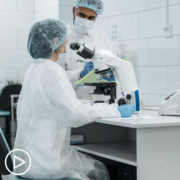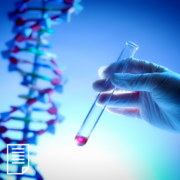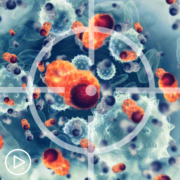Updates in AML Treatment and Research From ASCO 2023
Updates in AML Treatment and Research From ASCO 2023 from Patient Empowerment Network on Vimeo.
AML expert Dr. Omer Jamy shares highlights from the recent American Society of Clinical Oncology (ASCO) annual meeting, including an update on an immunotherapy agent showing promise as well as a vaccine therapy being studied for patients in a second remission.
Dr. Omer Jamy is a Leukemia and Bone Marrow Transplant Physician and Assistant Professor at the University of Alabama at Birmingham. Learn more about Dr. Omer Jamy.
Related Resources:

|

|

|
Transcript:
Dr. Omer Jamy:
My name is Omer Jamy, and I’m a leukemia and bone marrow transplant physician at the University of Alabama at Birmingham. And I’m really happy to be here today.
Katherine Banwell:
Well, thank you. Dr. Jamy, the ASCO 2023 meeting just wrapped up recently. What were the highlights in AML research from that meeting?
Dr. Omer Jamy:
Thank you. Yeah. There were several interesting studies in AML presented at ASCO this year. I’d like to highlight a couple of them in particular mainly because the focus on a novel mechanism of action, at least for patients with acute myeloid leukemia. And that mechanism of action being immunotherapy. So, we’re all aware that immunotherapy has had tremendous results in solid tumors.
It’s making its way into hematological malignancies mainly lymphomas as well as B-cell ALL which is acute lymphoblastic leukemia. And we are trying to investigate it in patients with AML as well.
And I think in that context there were a couple of abstracts which I thought were really interesting. The first one was actually presented by Dr. Anthony Stein and colleagues. Looking at a drug which is basically CD123 NK-cell engager.
And I spent a little bit trying to explain what that is, but basically, it’s a drug which it harnesses the person’s immune system to fight the cancer basically. So, it targets an antigen which is expressed on leukemia cells called CD123. And it binds it to natural killer cells or NK cells. So, this drug is taking the host which is the patient’s natural killer cells and the leukemia cells and binding them together and then leads to the activation of the NK cells which causes killing of the leukemia cells.
So, I think that mechanistically speaking that’s a very interesting concept to fine tune the person’s own immune system to fight the leukemia. This is obviously very early in development, so it’s a Phase I study, Phase I/Phase II. And they have presented results in 23 patients with relapsed/refractory AML.
And just to give you some background, CD123 is expressed in the majority of patients with acute myeloid leukemia. It’s also expressed in patients with myelodysplastic syndrome as well as ALL. So, the study had all three diseases, but we’re going to focus on AML today. So, there were 23 patients with acute myeloid leukemia in the study. And because it’s a Phase I study, they have to test it at the lowest dose, and then assess for safety, and then keep on going up on the dose. So, they actually looked at six dose levels. And luckily because it’s a Phase I, the primary objective is to make sure it’s a safe drug to administer.
And then second your objectives are basically if it’s efficacious or not. So, there were no dose limiting toxicities in the 21 evaluable patients out of the 23. So, that’s good. I think the lowest dose was 100 micrograms per kilograms per day. And the highest dose was 3,000 micrograms per kilogram per dose. The doses IV once or twice a week for the first couple of weeks, and then followed by weekly administration. In 23 patients the drug was thought to be safe. Again, no dose limiting toxicities.
With immunotherapy you worry about side effects such as cytokine release syndrome because you are basically putting your immune system in overdrive. So, you don’t want to make sure your immune system doesn’t wreak havoc on the body itself. So, cytokine release syndrome or CRS as well as associated neurotoxicity are two common side effects of most of these novel immunotherapies.
Which for the general audience, if they’ve heard about CAR T therapy or antibody drug conjugates or bispecifics, these are all under the same umbrella of immunotherapy. So, their side effect profile is pretty overlapping and different from what would be seen with conventional chemotherapy. So, they saw no neurotoxicity. And they saw CRS which was very manageable, right? Grade 1 or Grade 2 in a couple of patients. And as far as efficacy was concerned, out of the 23 patients they saw a response in three patients. Now that doesn’t sound very appealing, but you have to realize these are starting at a very low dose level and going up. So, when they looked at patients who were getting a dose of 1f,000 micrograms per kilograms per day, so a pretty hefty dose. Three out of eight patients, which roughly translates to 40% of the patients, achieved a remission. So, which to me for relapse refractory population is attractive. And it makes me want to investigate this molecule further.
And that is exactly what’s going on currently with the study. And I think again CD123 is an interesting target. The other companies targeting as well either as NK-cell engagers or antibody drug conjugates with other payloads. So, this is an area of active investigation. So, that’s where –
Katherine Banwell:
You said –
Dr. Omer Jamy:
Yeah.
Katherine Banwell:
Yeah, you said there was another study. Could you briefly tell us about that.
Dr. Omer Jamy:
Exactly. So, the other study is also harnessing the person’s immune system to fight leukemia in a very different way. And this is a randomized Phase III study, ongoing. It’s international. And it’s a trials in progress meaning that it’s accruing across the country, or actually across the globe. And I wanted to highlight this in case people want to reach out to centers where this study is ongoing and want to participate in it. This is a trials in progress poster of a compound called GPS which is basically a vaccine against a protein called Wilm’s tumor 1 or WT1 which is vitally expressed on leukemia cells as well.
Now this is a tumor vaccine actually which is a novel concept of an AML. So, vaccines as you know, are better at prevention than treatment. So, this is a maintenance drug for people in second remission or beyond who are unable to proceed to stem cell transplantation.
So, they get the opportunity to enroll in this Phase III which is a randomized study of either GPS versus a physician’s choice which includes a wide variety of agents to choose from making it a pretty reasonable control arm and follows patients to see if the primary end point being overall survival. So, I think again for patients who achieve second remission or beyond ideally, they should proceed to stem cell transplantation. But there are several barriers to that including advanced age, comorbidities, socioeconomic barriers. So not everyone can proceed. So, for patients in that situation, there is no standardized maintenance therapy.
And in that context I feel like an immunotherapy agent basically this vaccine which has shown very promising results in single-arm Phase I, Phase II studies is now being investigated in a Phase III study. And because it’s a trials in progress I cannot share any results with you because we don’t have any results. But I feel like people should know about this because it is open at 20 to 30 centers in the US.
And it’s an option out there for patients who would like to participate in such a clinical trial.









